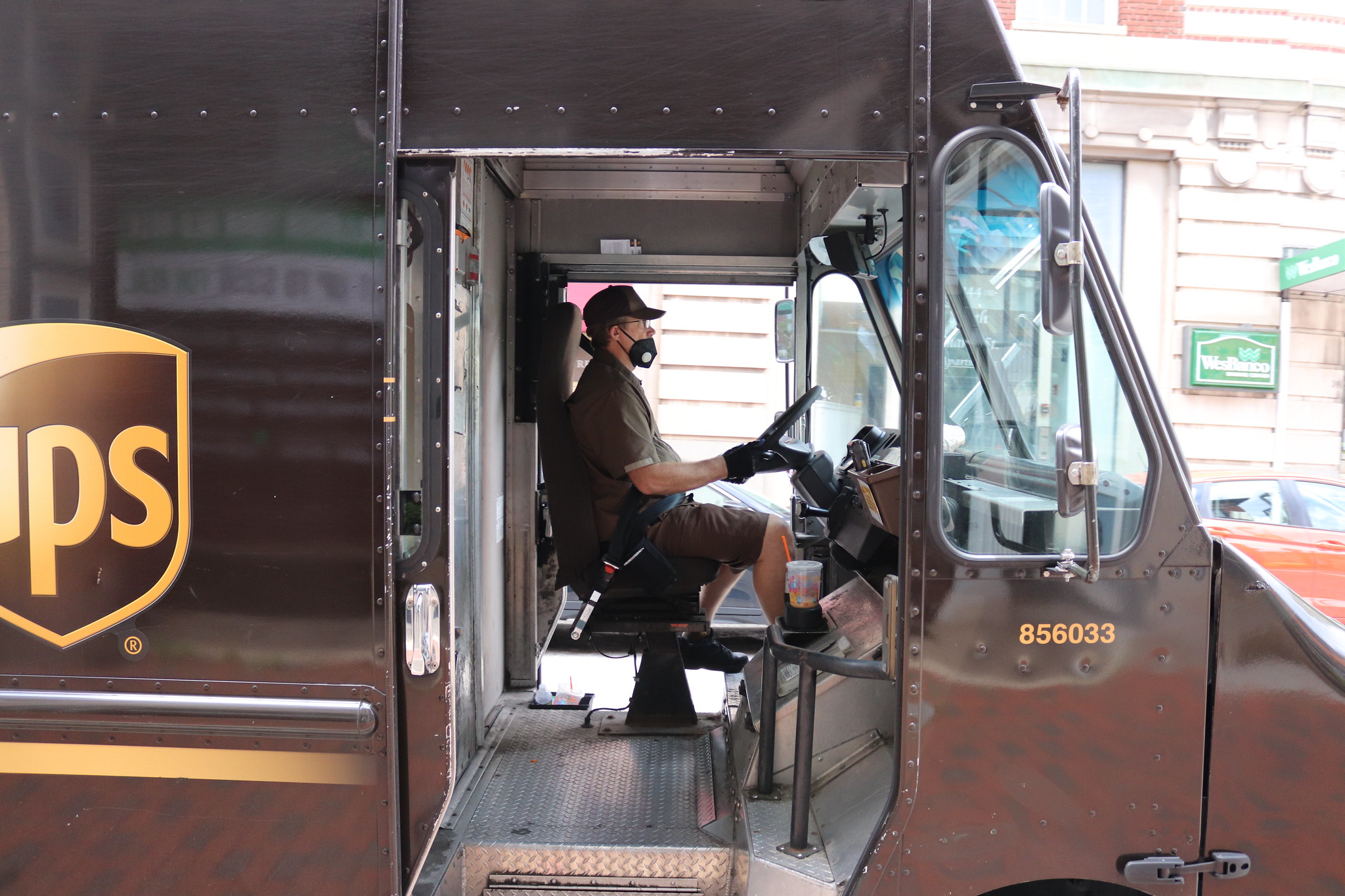After graduating from college, I faced the tricky decision of what job to find as a socialist in a historically precarious labor market.
Friends at nonprofits complained about the ineffectiveness of their organizations and endless, soul-crushing cycles of fundraising; others who worked at cafes and bars warned me of the instability and low pay of their jobs. Union staffer friends bemoaned the conservative policies of the locals they worked for but as non-members had no hope of changing.
I wondered: Is the only option really to just get a politically unproductive but “morally” passable nine-to-five and then be an activist on the weekend?
Fortunately, some comrades involved in the labor movement suggested an alternative — getting a union job. Getting a rank-and-file union job would give me the opportunity to engage in meaningful organizing with my co-workers daily, along with an amount of economic security rare in the gig economy. After some consideration, I got a job driving at UPS, and I haven’t regretted the choice since.
Why UPS?
Since the restructuring of U.S. industry in the 1970s and 1980s, when millions of workers were displaced from manufacturing through automation, offshoring, and just-in-time production methods, logistics has grown to employ a massive 3.5 million workers. Employers’ lean production methods, which were implemented to squeeze more productivity out of fewer workers, have concentrated much of the United States’ economic flows in a series of logistical chokepoints, which act as hubs for the rest of the economy. Kim Moody describes these “nodes” in On New Terrain as being “enormous logistics clusters of transportation hubs, massive warehouses and distribution centers…that bring thousands of workers into finite geographic concentrations.”
Within the logistics sector, UPS is one of the largest employers, with 413,000 employees in the U.S. alone, 290,000 of whom are Teamsters.
But the level of organization at UPS is sadly unique. Logistics is an industry dominated by non-union companies like Amazon and FedEx. With 1.4 million members, the Teamsters have a lot of potential power that could be used to organize these workplaces, carry out successful strikes, and do new organizing at other logistics companies. Unfortunately, this power has long lain dormant thanks to the corrupt business unionism embodied in the James P. Hoffa Jr. administration.
If we’re ever going to rebuild a militant and powerful working class, that situation has to change.
Fortunately, there exists a vibrant reform movement in the Teamsters — Teamsters for a Democratic Union — which was founded by rank-and-file Teamsters in the 1970s, several of whom were socialists themselves. By getting a job at UPS, socialists can not only organize on the shop floor in a highly strategic sector, they can do so in coordination with other unionists across the U.S. through TDU. And with TDU backing a reform slate for Teamsters International leadership in 2021, and a new UPS contract up for negotiation in 2023, the next few years will be crucial for organizing within the Teamsters.
Shop Floor Organizing
One could ask, “Why can’t we just support logistics workers from the sidelines, and organize instead at whatever jobs we happen to already have?”
Day-to-day organizing on the shop floor builds the foundations of trust required for more militant working-class activity, which manifests itself during explosive actions such as strikes but also in smaller actions like standing up to management, filing grievances, and enforcing workplace safety.
In my time at UPS, I’ve been taught by more senior union activists the small methods of workplace resistance that keep us protected on the job and set limits to the exploitation management is always attempting to intensify through understaffing, falsification of records, and discipline.
Some of these methods are more individual, like working as safely as possible in defiance of the company’s demands for greater speed and filing grievances to assert our personal rights. Others, however, build off of small acts of solidarity, such as helping new members write grievances for stolen wages or against management harassment, helping a co-worker fight for workers compensation when management threatens them and dismisses their valid injury claims, or carrying out work-to-rule slowdowns when management attempts to squeeze more out of us through over-dispatching our package delivery loads.
While these actions are minor, it is the solidarity built through these everyday, reciprocal engagements in fellow union brothers’ and sisters’ struggles that lay the groundwork for bigger fights such as strikes.
While these small acts of resistance do of course happen whether socialists are present or not, historically, leftists in the workplace have been able to escalate and connect disparate struggles on the shop floor, and across shops, when present in sufficient numbers. Leftists achieve this not necessarily as the leaders themselves but rather by working with organic workplace leaders who have the trust and respect of their coworkers.
For example, TDU activists were able to spread a petition nationally at the beginning of the COVID-19 outbreak to win paid sick leave and PPE, demands which were ultimately agreed upon by the union and UPS. Imagine what would have been possible if dozens of socialists had been active at UPS — hazard pay, temperature checks, free testing, longer sick leave, and much more would have been conceivable organizing goals.
If we wish to develop close, trusting relationships with our fellow workers, we must be present in these daily struggles. It is not enough for socialists to suddenly appear with bullhorns and banners when a strike date is set. If we want to demonstrate the relevance of socialist politics, we must demonstrate it materially and interpersonally through day-to-day organizing on the shop floor.
Movement Building and Collective Action
While a socialist movement embedded in the workers’ movement was the basis for Left politics before the Cold War, since then the Left and the organized labor movement have been separated through class warfare from above, with the result that both have been demobilized, fragmented, and greatly weakened. A second goal of socialists getting jobs at UPS is to eventually bring the most politically active workers into our movement.
The workforce at UPS is very diverse, has a strong potential interest in socialist economic goals, and holds a unique structural power to achieve those goals. It would be a great boon to the Left if we could bring people like my co-workers into our movement. Organic, working-class leaders should be leaders of DSA.
Indeed, most DSA members agree that the socialist movement should be led by worker-activists and should more accurately reflect the diverse working class of the U.S., which the largely white-collar milieu of DSA is currently separate from. Yet without building close relationships of trust, founded through the material solidarity that is forged in the workplace, how would such a transformation occur?
The failed pamphleteering and cheerleading from a distance of various Left sects over the past 50 years has given us a strong demonstration of what not to do, and only confirms the need to build relationships through organizing in the workplace — the elementary site of capitalist exploitation and thus solidaristic worker resistance. Though we come from different backgrounds, and may currently have different conceptions of politics, my friendships with my co-workers are in some ways deeper and more trusting than most others I have, due to our shared experiences of struggle. While these relationships may have begun in the workplace, they naturally extend beyond it.
Finally, by integrating ourselves in strategic workplaces such as UPS, and as members of powerful unions such as the Teamsters, we will position ourselves to coordinate collective working-class action during moments of political crisis. For example, as the COVID-19 crisis began, many leftists eagerly declared the need for a general strike on Facebook, and have since crossed their fingers for union support of social demands such as rent cancellation, universal sick leave, and stronger unemployment benefits. But without a strong base in “essential” workplaces such as UPS, where the power potentially resides to achieve such demands, these nice wishes remain just that.
If we wish to bridge the gap between an inspired but relatively powerless socialist movement on the one hand, and a powerful but politically demobilized working class on the other, we must collectively concentrate ourselves in workplaces strategic for socialist organizing, UPS being one of the foremost. It is not a matter of “infiltrating” or seeking these jobs from some mysterious “outside,” as critics of the rank-and-file strategy have held; after all, we are all forced to sell our labor or starve, regardless of where we sell it.
Liberals certainly have no problem elevating nonprofit and social-justice-oriented business jobs, which on the whole do nearly nothing to challenge the dominance of the capitalist class. As socialists, the choice of a job presents itself differently to us. The question becomes: Where can I sell my labor that gives me the best organizing opportunities to help build the power of the socialist movement? Based on my experience, the answer is clear.




